Understanding the Principles and Practices of Assessment
Added on 2023-01-11
24 Pages6719 Words27 Views
Understanding the
Principles and
Practices of
Assessment
Principles and
Practices of
Assessment
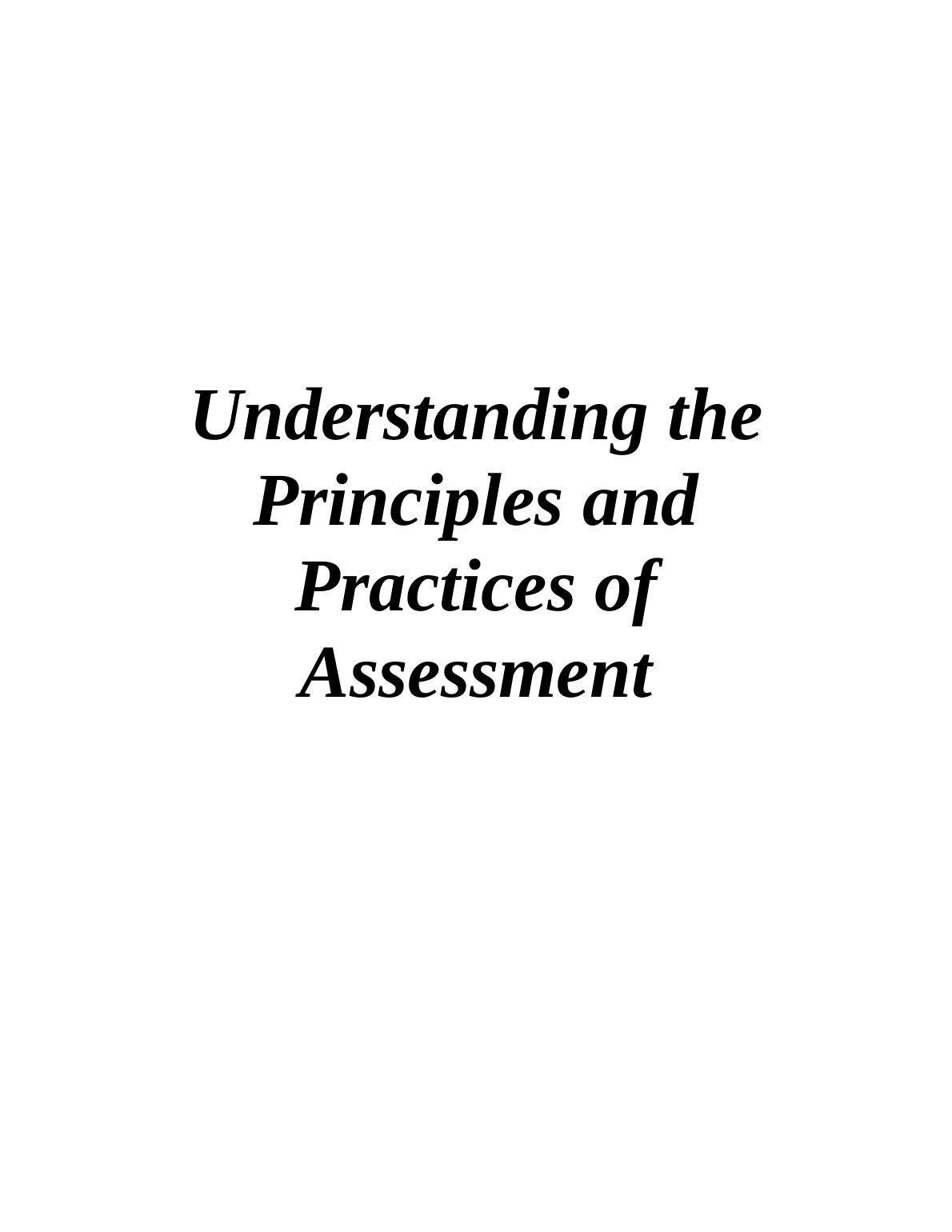
Table of Contents
INTRODUCTION...........................................................................................................................1
MAIN BODY...................................................................................................................................1
2. Defining concepts addition to principles of assessment.....................................................1
6. Summarising key factors that are needed to be considered at the time of planning
assessment..............................................................................................................................2
7. Stating as well as evaluating three benefits of using holistic approach to assessment.......3
8. From the skill area, selection of particular qualification part and explaining the ways to plan
holistic assessment..................................................................................................................3
9. Summarising the ways various types of risks may be involved in assessment in an
individual responsibility area and the ways risks are minimised...........................................4
10. Explaining importance of involving learner addition to other people in process of
assessment..............................................................................................................................5
11. Briefly describing the reasons for the following information types must be made available
to learner as well as others that are involved in assessment process which will be used.......6
12. The ways in which peer feedback together with self assessment can be utilised for
promoting learner involvement as well as personal responsibility in process of assessment.7
13. Explaining the ways assessment arrangements can be adapted for the purpose of meeting
particular needs of learner......................................................................................................7
14. Explaining the mechanisms an individual as assessor would judge the evidence on the
basis of various aspects..........................................................................................................8
15. Explaining the ways an individual as assessor would ensure the decision of assessment9
16. Evaluation of importance of standardisation together with quality assurance by briefly
explaining the reason it is needed as well as what may happen when it do not arise in
assessment process...............................................................................................................10
17. Briefly describing internal quality assurance addition to standardisation procedures or
activities which take place in an individual practice area....................................................10
18. Naming and describing relevant internal along with final appeal procedures for following
at the time of disputes related to assessment within practice area.......................................11
INTRODUCTION...........................................................................................................................1
MAIN BODY...................................................................................................................................1
2. Defining concepts addition to principles of assessment.....................................................1
6. Summarising key factors that are needed to be considered at the time of planning
assessment..............................................................................................................................2
7. Stating as well as evaluating three benefits of using holistic approach to assessment.......3
8. From the skill area, selection of particular qualification part and explaining the ways to plan
holistic assessment..................................................................................................................3
9. Summarising the ways various types of risks may be involved in assessment in an
individual responsibility area and the ways risks are minimised...........................................4
10. Explaining importance of involving learner addition to other people in process of
assessment..............................................................................................................................5
11. Briefly describing the reasons for the following information types must be made available
to learner as well as others that are involved in assessment process which will be used.......6
12. The ways in which peer feedback together with self assessment can be utilised for
promoting learner involvement as well as personal responsibility in process of assessment.7
13. Explaining the ways assessment arrangements can be adapted for the purpose of meeting
particular needs of learner......................................................................................................7
14. Explaining the mechanisms an individual as assessor would judge the evidence on the
basis of various aspects..........................................................................................................8
15. Explaining the ways an individual as assessor would ensure the decision of assessment9
16. Evaluation of importance of standardisation together with quality assurance by briefly
explaining the reason it is needed as well as what may happen when it do not arise in
assessment process...............................................................................................................10
17. Briefly describing internal quality assurance addition to standardisation procedures or
activities which take place in an individual practice area....................................................10
18. Naming and describing relevant internal along with final appeal procedures for following
at the time of disputes related to assessment within practice area.......................................11
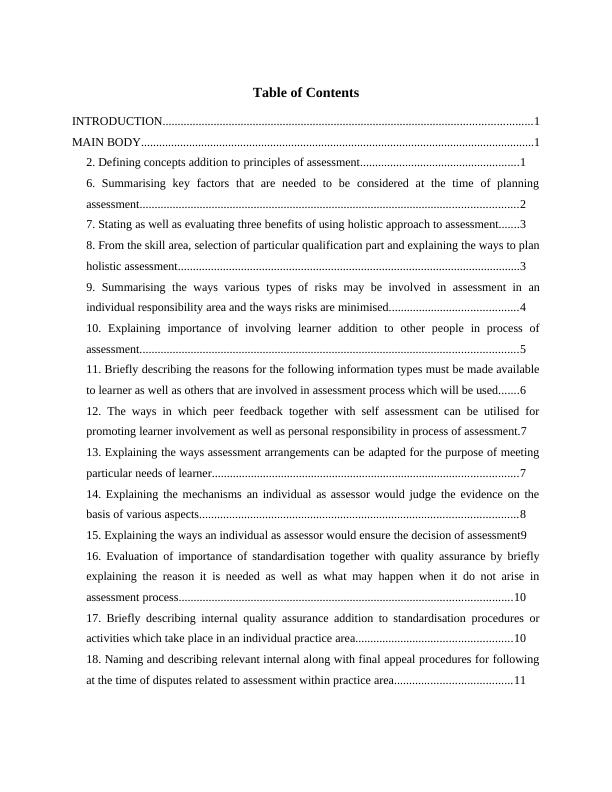
19. Explaining the importance for follow procedures for information management in context
to assessment........................................................................................................................11
20. The ways in which following feedbacks as well as questioning contributes towards
assessment process...............................................................................................................12
21. Explanation of legal issues, procedures together with policies related with assessment.13
22. Brief description of the manner in which technologies contributes in assessment process.
..............................................................................................................................................14
23. The ways best practice is ensure in assessment process for various aspects to following.15
24. Explaining values related to reflective practice along with continuous professional
development in procedure of assessment.............................................................................16
25. Explaining the ways in which currency of expertise as well as competence as assessor role
are maintain..........................................................................................................................16
26. Reflection on recent CPD experience addition to completion of table..........................16
CONCLUSION..............................................................................................................................17
REFERENCES..............................................................................................................................18
to assessment........................................................................................................................11
20. The ways in which following feedbacks as well as questioning contributes towards
assessment process...............................................................................................................12
21. Explanation of legal issues, procedures together with policies related with assessment.13
22. Brief description of the manner in which technologies contributes in assessment process.
..............................................................................................................................................14
23. The ways best practice is ensure in assessment process for various aspects to following.15
24. Explaining values related to reflective practice along with continuous professional
development in procedure of assessment.............................................................................16
25. Explaining the ways in which currency of expertise as well as competence as assessor role
are maintain..........................................................................................................................16
26. Reflection on recent CPD experience addition to completion of table..........................16
CONCLUSION..............................................................................................................................17
REFERENCES..............................................................................................................................18
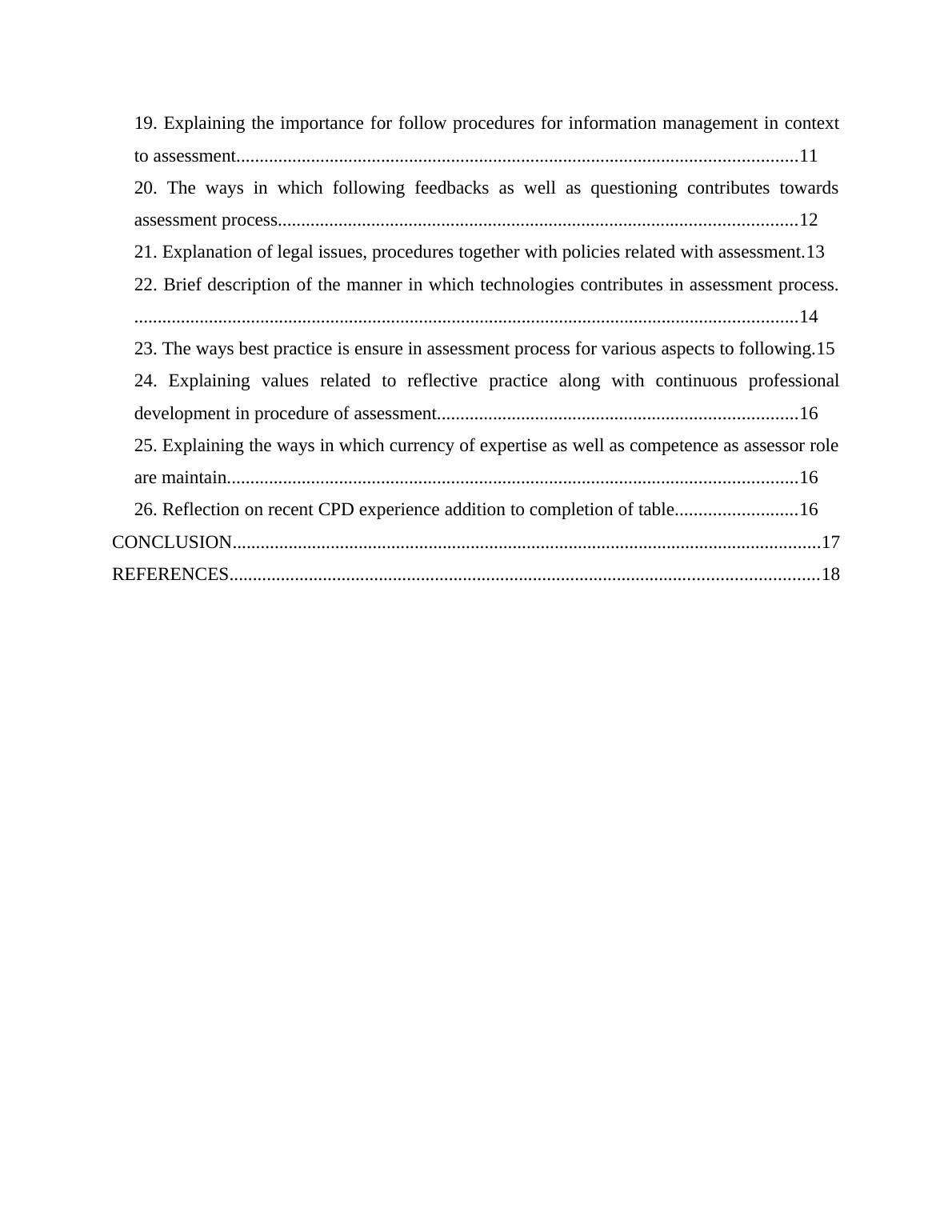
INTRODUCTION
An assessment is defined as action to assess workings, skills and competence of learner
against defined standards by awarding body (Cash, 2017). It involves considering something and
giving judgement. The present report is prepared on understanding principles addition to
practices of assessment in which answers are given for wide number of questions.
MAIN BODY
2. Defining concepts addition to principles of assessment
Principles or concept Definition
Validity and Reliability Principle of reliability is defined as steadiness of scores over
distinct rates as well as time.
Similarly, Principle of validity is defined to the test which
calculates what it alleges to measure.
In accordance to VASCR,
Valid principle states that assessment must be
appropriate to subject or qualification which must be
assessed as per the defined criteria.
Authentic principle state about the assessment that is
produced by learner must have authentic information.
Current principle states that the works must be related
to the assessment time.
Sufficient principle states that an assessment should
cover all criteria in sufficient manner about the
learning.
Reliable principle states about reliability of
assessment with consistent to learners, time and
needed level.
Authentic, sufficient and current Principle of authentic refers to the work must be produced by
learner only (Camuffo, 2019).
Principle of sufficient is said to the work of assessment must
cover all criteria together with learning outcomes.
1
An assessment is defined as action to assess workings, skills and competence of learner
against defined standards by awarding body (Cash, 2017). It involves considering something and
giving judgement. The present report is prepared on understanding principles addition to
practices of assessment in which answers are given for wide number of questions.
MAIN BODY
2. Defining concepts addition to principles of assessment
Principles or concept Definition
Validity and Reliability Principle of reliability is defined as steadiness of scores over
distinct rates as well as time.
Similarly, Principle of validity is defined to the test which
calculates what it alleges to measure.
In accordance to VASCR,
Valid principle states that assessment must be
appropriate to subject or qualification which must be
assessed as per the defined criteria.
Authentic principle state about the assessment that is
produced by learner must have authentic information.
Current principle states that the works must be related
to the assessment time.
Sufficient principle states that an assessment should
cover all criteria in sufficient manner about the
learning.
Reliable principle states about reliability of
assessment with consistent to learners, time and
needed level.
Authentic, sufficient and current Principle of authentic refers to the work must be produced by
learner only (Camuffo, 2019).
Principle of sufficient is said to the work of assessment must
cover all criteria together with learning outcomes.
1
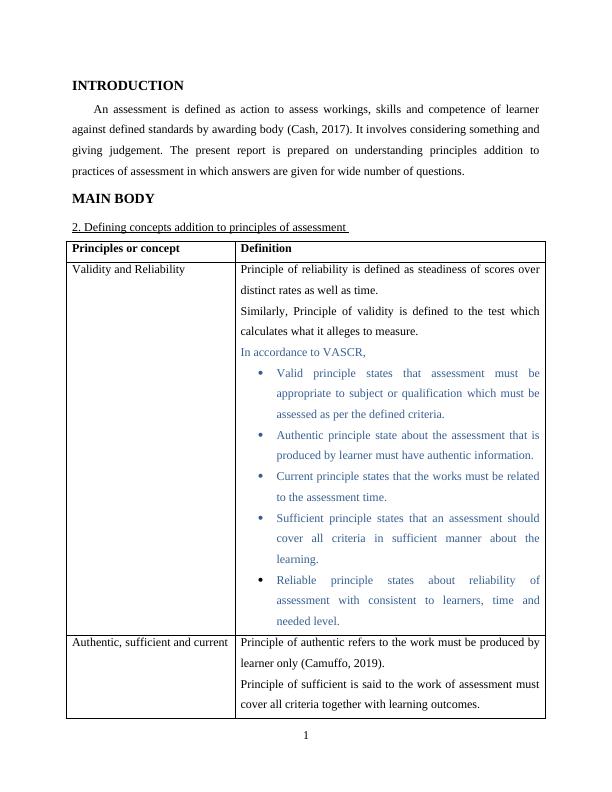
Principle of current is all about relevancy at the timings of
assessment that is around three to six months..
Importance of fairness as well as
objectivity
Fairness is important in learner’s life as it provides equal
chance to all for accomplishing good assessment. It is
significant to act fairly while completing assessment.
Likewise, it is also important to be objective as it reflects
statements made in assessment are related to solid evidences.
Importance of transparency Transparency is defined to visibility of working made by
learner within learning environment. It is important for
learner as it improves quality addition to enhance engaging
learning experiences.
Role of evidence in making
decisions related to assessment
Evidence is defined as proof that supports the scores or grades
given in assessment. Evidence plays crucial role of proofs,
progress of adequacy and states whether the assessment has
sufficient content as per standards in making decision for an
assessment.
Procedure of making assessment
judgements against defined
criteria
The procedure to make judgement for an assessment against
defined criteria involves various stages. The first stage is
planning and preparing in which assessor plans methods,
activities and other aspects. Further, they arranges all the
required aspects to prepare themselves in judging assessment.
The next is assessment phase in which assessment is
conducted and marking are given. The next stage is of
feedback stage in which tutor gives feedback to learner in
respect of assessment decision (Congalton and Green, 2019).
The last is evaluation phase in which entire process is
evaluated again so to check all things are done as per defined
criteria.
6. Summarising key factors that are needed to be considered at the time of planning assessment
While planning assessment, the key factors that are mandatory to consider are as follows:
2
assessment that is around three to six months..
Importance of fairness as well as
objectivity
Fairness is important in learner’s life as it provides equal
chance to all for accomplishing good assessment. It is
significant to act fairly while completing assessment.
Likewise, it is also important to be objective as it reflects
statements made in assessment are related to solid evidences.
Importance of transparency Transparency is defined to visibility of working made by
learner within learning environment. It is important for
learner as it improves quality addition to enhance engaging
learning experiences.
Role of evidence in making
decisions related to assessment
Evidence is defined as proof that supports the scores or grades
given in assessment. Evidence plays crucial role of proofs,
progress of adequacy and states whether the assessment has
sufficient content as per standards in making decision for an
assessment.
Procedure of making assessment
judgements against defined
criteria
The procedure to make judgement for an assessment against
defined criteria involves various stages. The first stage is
planning and preparing in which assessor plans methods,
activities and other aspects. Further, they arranges all the
required aspects to prepare themselves in judging assessment.
The next is assessment phase in which assessment is
conducted and marking are given. The next stage is of
feedback stage in which tutor gives feedback to learner in
respect of assessment decision (Congalton and Green, 2019).
The last is evaluation phase in which entire process is
evaluated again so to check all things are done as per defined
criteria.
6. Summarising key factors that are needed to be considered at the time of planning assessment
While planning assessment, the key factors that are mandatory to consider are as follows:
2
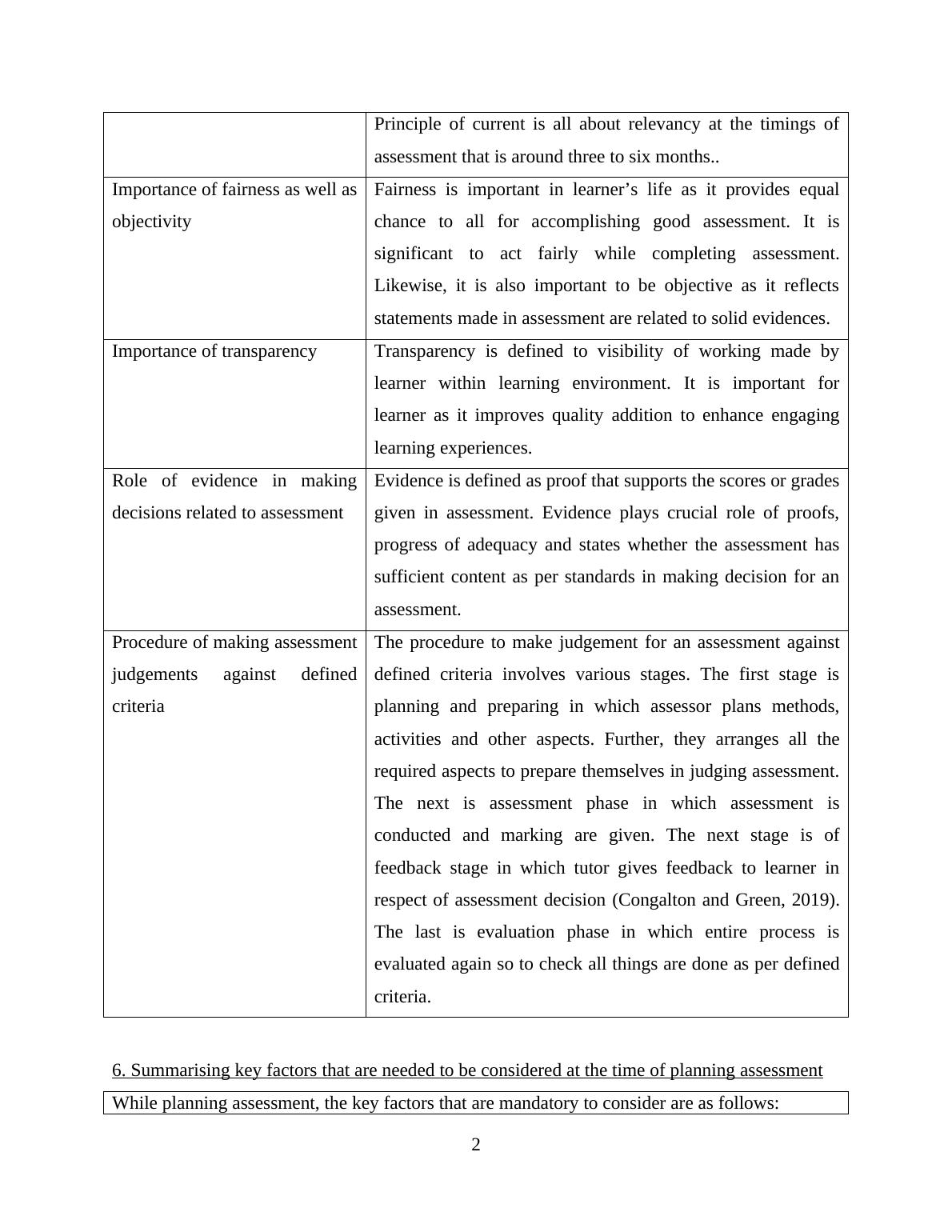
Standards or criteria to be used.
Choices of methods of assessment.
Location and resources.
Kinds and quantity of required evidence.
Communication with learner along with the people involved in assessment.
Time and duration in which assessment is to be conducted.
Particular needs of learner and support requirements.
Ways to manage assessment process, recoding of assessment processes along with
decisions.
Strategies and other tactics.
Feedback to learners and evaluation.
7. Stating as well as evaluating three benefits of using holistic approach to assessment
Benefits Description
Covering various
things
Holistic approach to assessment benefits in covering various things at
single thing. With this approach, a assessor can overlook towards wide
number of things such as skill level, suitability and competence of
learner.
Addressing issues Holistic approach also benefits in helping learner to address issues in
performance as well as skill gap in effective manner. With this approach,
a learner addresses the issues so that they can make improvements in the
same assessment to attain high grades. Moreover, holistic approach
provide advantageous situations to student through focusing in the marks
and working hard for addressing issues in assessment.
Fair representation Holistic approach also benefits in creating final mark for learner in fair
manner. Through linking various learning aspects via holistic assessment
approach, the assessor fairly represent ability of learner.
3
Choices of methods of assessment.
Location and resources.
Kinds and quantity of required evidence.
Communication with learner along with the people involved in assessment.
Time and duration in which assessment is to be conducted.
Particular needs of learner and support requirements.
Ways to manage assessment process, recoding of assessment processes along with
decisions.
Strategies and other tactics.
Feedback to learners and evaluation.
7. Stating as well as evaluating three benefits of using holistic approach to assessment
Benefits Description
Covering various
things
Holistic approach to assessment benefits in covering various things at
single thing. With this approach, a assessor can overlook towards wide
number of things such as skill level, suitability and competence of
learner.
Addressing issues Holistic approach also benefits in helping learner to address issues in
performance as well as skill gap in effective manner. With this approach,
a learner addresses the issues so that they can make improvements in the
same assessment to attain high grades. Moreover, holistic approach
provide advantageous situations to student through focusing in the marks
and working hard for addressing issues in assessment.
Fair representation Holistic approach also benefits in creating final mark for learner in fair
manner. Through linking various learning aspects via holistic assessment
approach, the assessor fairly represent ability of learner.
3
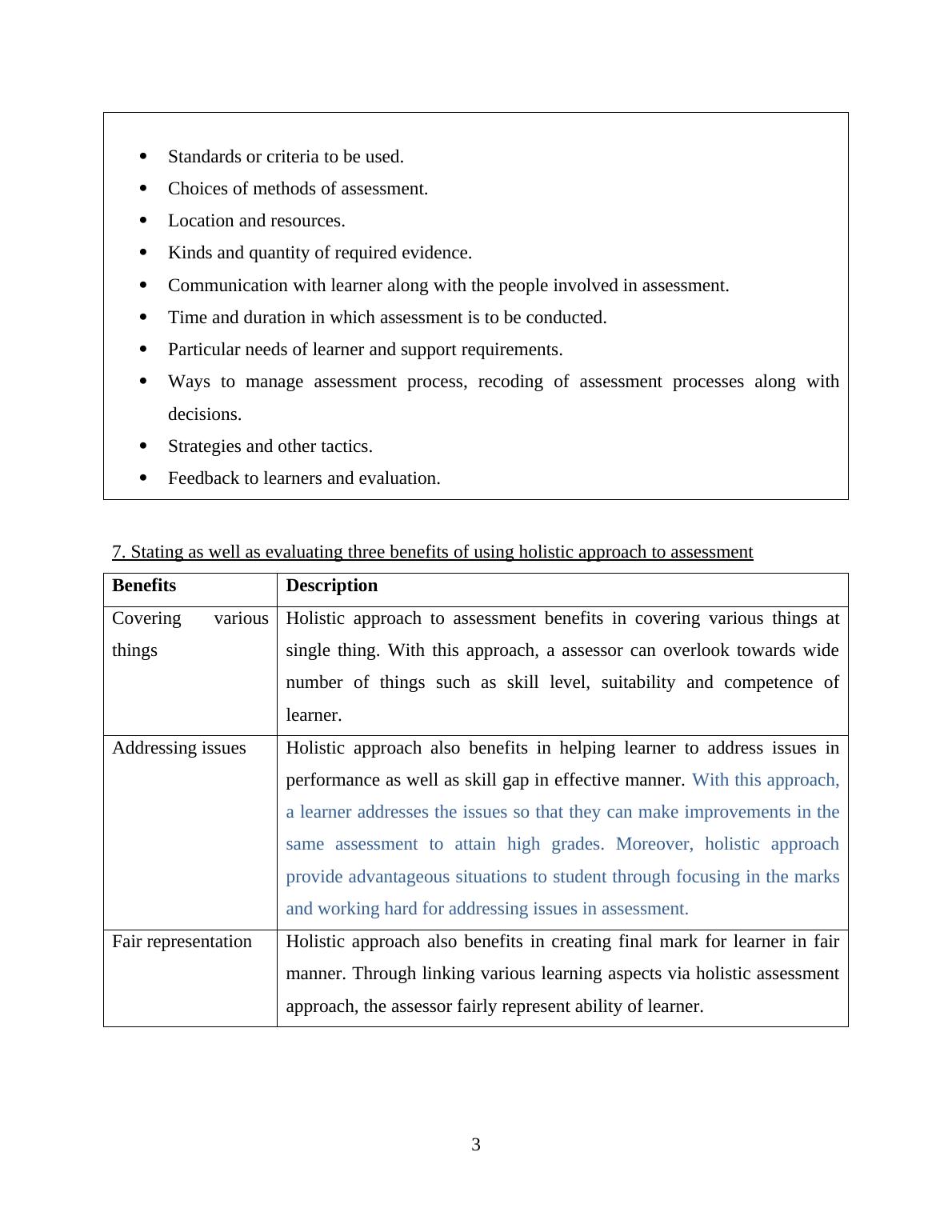
End of preview
Want to access all the pages? Upload your documents or become a member.
Related Documents
Understanding the Principles and Practices of Assessmentlg...
|15
|5404
|451
Principles and Practices of Assessment in Learning and Developmentlg...
|22
|7779
|193
Understanding the Principles and Practices of Assessmentlg...
|24
|8227
|51
Understanding the Principles and Practices of Assessmentlg...
|6
|1469
|24
Planning, Delivering and Assessing Learners in Own Specialist Arealg...
|21
|7188
|458
BSBITU213 Use Digital Technologies to Communicate Remotelylg...
|20
|4044
|20
